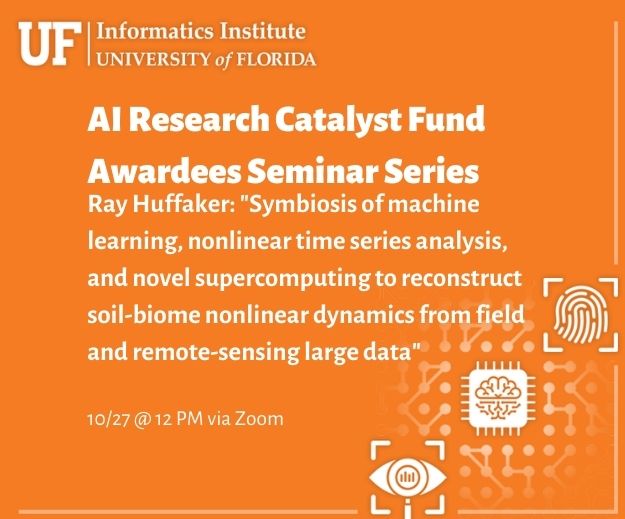AI Research Catalyst Fund Awardees Virtual Seminar Series – Dr. Ray Huffaker

- This event has passed.
AI Research Catalyst Fund Awardees Virtual Seminar Series – Dr. Ray Huffaker
October 27, 2021 @ 12:00 pm - 1:00 pm

AI Research Catalyst Fund Awardees Virtual Seminar Series
“Symbiosis of machine learning, nonlinear time series analysis, and novel supercomputing to reconstruct soil-biome nonlinear dynamics from field and remote-sensing large data”
by Dr. Ray Huffaker
Professor in Agricultural and Biological Engineering, IFAS
Wednesday, October 27, 2021
ABSTRACT:
Many important components of biophysical systems are inherently non-linear and often appear to behave erratically. As a result, they are notoriously difficult to characterize and predict. One such system is the soil, which mediates Earth’s water, mass and energy exchanges, and provides essential life services like natural waste treatment, food production, and biodiversity. Soil is living matter that constantly changes in response to complex abiotic and biotic interactions. Converting new satellite big-data products into knowledge of real-world soil dynamics remains a challenge. AI offers a promising computation approach for understanding complex soil dynamics that have remained undetected by past empirical approaches. A recent proof-of-concept demonstrates that new types of AI (Echo State Networks or “reservoir computing” -RC) can learn complex nonlinear dynamics from clean data generated by closed ‘toy’ models with known covariates, causal interactions, and dynamics. However, in modeling open real-world biophysical systems like the soil, we do not know all covariates involved or whether/how they interact. We do not directly observe dynamics, and must infer them from noisy data. We will address these challenges by preprocessing data inputted into RC with nonlinear time series analysis (NLTS) to filter noise and test for stationarity, detect causal interactions, and reconstruct state-space dynamics from denoised data. This increases the dynamic efficiency of RC since reservoirs learn complex dynamics of stationary real-world dynamic systems from denoised data taken from causally-interactive covariates. We will employ the new UF-NVIDIA-GPU infrastructure to automate a large parallel grid search of RC hyper-parameters, and screen for architectures learning dynamics reconstructed with NLTS. We will deliver a fully-automated RC-NLTS graphical user interface (GUI) software that will serve as reliable soil ‘digital-twin’ to analyze remote-sensing data provided by previous UF research trials, and the long-term wireless sensor network SoilNet at the Wüstebach test site, Jülich Research Center (Germany). Operationalizing AI RC for real biophysical data has broader impacts in addressing pressing environmental challenges involving nonlinear biophysical processes and creating AI-based early-warning systems for quick prediction of extreme environmental events (flooding, drought, landslides, fires).

Bio:
Ray Huffaker works in the ecosystems complexity group in the Department of Agricultural and Biological Engineering at the University of Florida, USA. He specializes in recurrent neural network AI, empirical nonlinear dynamics techniques; biological and economic modeling of water and other ecosystem resources; economic and food system dynamics; and natural resource and environmental law. He teaches doctoral courses in nonlinear data diagnostics and biological modeling. He recently co-authored a book on Nonlinear Time Series Analysis: Huffaker, Bittelli, &Rosa (2017), Nonlinear Time Series Analysis with R, Oxford University Press.
Wednesday, October 27, 2021
12:00PM – 1:00PM
Via Zoom
RSVP below. Instructions to attend talk via Zoom will be emailed to you.

